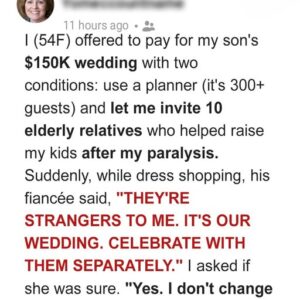At first, I thought it was sweet that my future stepdaughter, seven-year-old Amila, woke up before dawn to cook breakfast and clean the house. But soon, I noticed something was wrong. She was tiny and fragile, yet she handled hot appliances and scrubbed floors like a grown-up—too eager to please, too desperate for perfection.
One morning, I asked why she worked so hard. She whispered, “I heard Daddy say that if a woman doesn’t cook and clean, no one will love her. I’m afraid he won’t love me if I don’t do all this.”
That broke me. How could Ryan, my fiancé, still believe in such outdated, harmful ideas? I decided to act.
The next days, I handed Ryan chore after chore, watching his confusion grow. Then I confronted him: “Your daughter thinks she must earn your love by working like a servant. This isn’t 1950. She’s just a kid, not a maid.”
That night, Ryan apologized to Amila, promising unconditional love.
Watching them hug, I realized love means breaking toxic cycles—and protecting childhood at all costs.
Not in my house.





